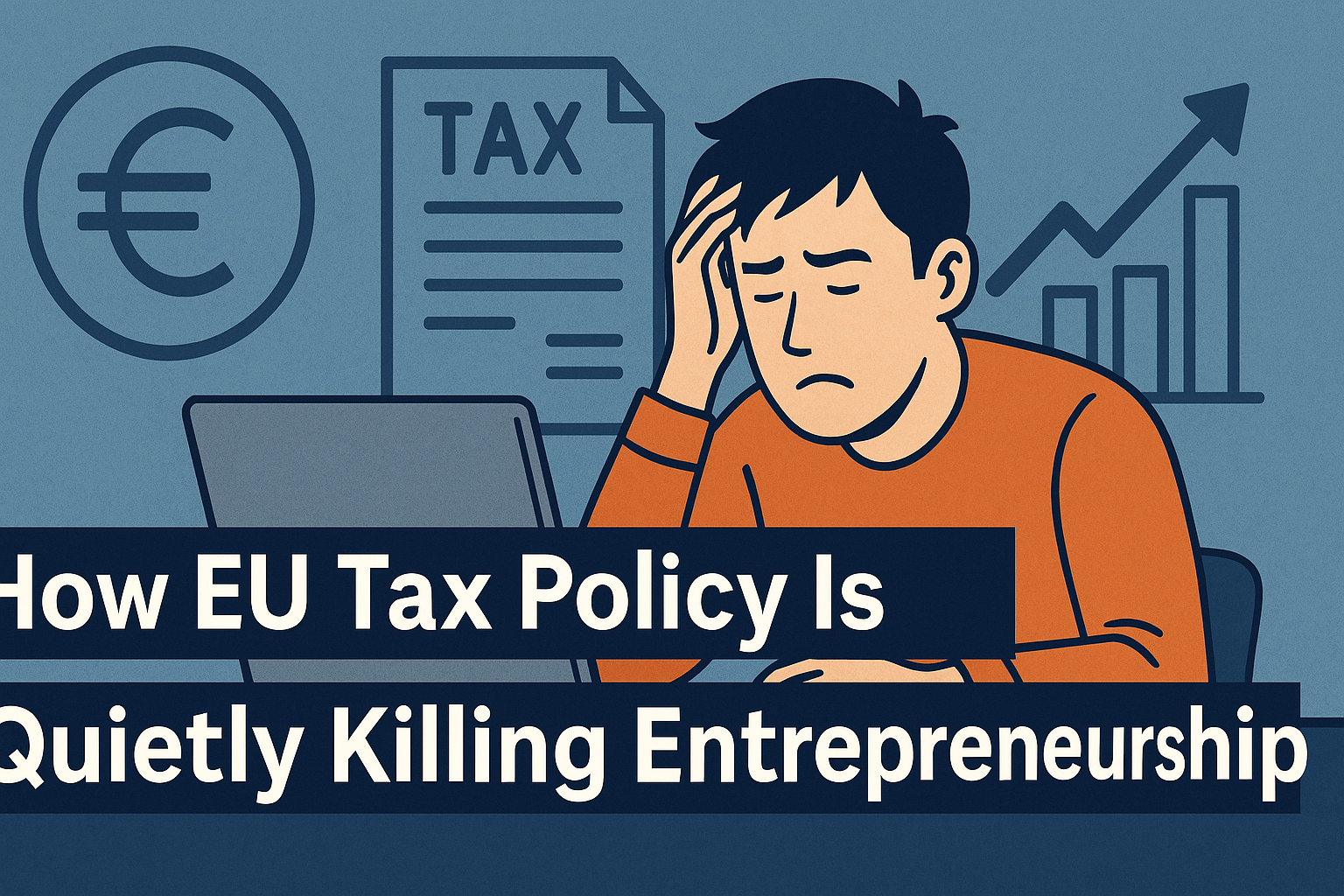
How EU Tax Policy Is Quietly Killing Entrepreneurship (And Why Smart Founders Are Looking Elsewhere)
Summary:
The European Union claims to support innovation and entrepreneurship, but its increasingly aggressive and complex tax policies are driving a silent exodus of founders, freelancers, and digital businesses. From digital VAT nightmares to punitive crypto regulations, this article explores how the EU is becoming a hostile environment for modern entrepreneurs—and what the alternatives are.
Introduction: Europe’s Innovation Paradox
Europe loves to talk about innovation. EU leaders praise startups, host “Digital Decade” summits, and pump billions into tech grants and accelerators. But step outside the PR bubble, and you’ll find a different story.
Founders across the continent are struggling—not due to competition or failure, but because of taxation.
Entrepreneurs are waking up to the fact that Europe is not designed for them. It’s designed for large corporations, legacy industries, and tax collection at all costs.
Welcome to the new European paradox: Innovation is celebrated, but punished.
1. The VAT Trap: Death by 27 Tax Authorities
If you run an online business in the EU, you’re probably already familiar with the nightmare that is VAT MOSS (Mini One-Stop Shop). This system was meant to simplify VAT for digital services. Instead, it has become a Kafkaesque maze.
- You must track your customer’s location.
- Charge them the correct VAT rate from 27+ countries.
- Store proof of location for 10 years (yes, 10).
- File country-specific VAT reports or go through the bloated OSS system.
And if you get anything wrong? Fines. Penalties. Backdated taxes. Even if you’re a solo creator making €2,000 a month selling eBooks.
This alone has killed thousands of micro-businesses in Europe since 2015. Many shut down, or simply stopped selling to EU customers altogether.
2. Crypto & Web3: Treated Like Criminals
The EU’s war on crypto is one of the clearest signs of how out of touch its tax policy has become.
- MiCA (Markets in Crypto-Assets) imposes heavy reporting requirements even on small token creators.
- Many countries (like Germany, France, and Spain) tax crypto trades at up to 45%.
- Some even tax unrealized gains or wallet-to-wallet transfers.
- KYC/AML laws are enforced so aggressively that platforms must collect more data than traditional banks.
Imagine trying to bootstrap a DeFi protocol, NFT marketplace, or tokenized startup in that environment. Many teams have already fled—to Switzerland, Dubai, or even the US.
3. The Freelancer Squeeze: You’re a Suspect by Default
EU tax authorities are increasingly treating freelancers as tax evaders-in-waiting. Governments are obsessed with “closing the gap” between salaried workers and independent contractors. The result?
- Reverse tax audits: You must prove you’re not hiding income.
- “False self-employment” investigations: You may be forced to register as a company and pay corporate tax—just for having a single client.
- Retroactive classification: Tax authorities can reclassify your earnings and demand years of back taxes, fines, and interest.
In short: they say they want entrepreneurship, but treat you like a criminal for not being an employee.
4. Overregulation Is the Real Killer
Let’s be clear: the problem is not just high tax rates. It’s the combination of high rates + high complexity + low trust.
In the EU, you’re not rewarded for trying to follow the rules. You’re punished for failing to anticipate them.
Want to incorporate in Estonia but live in Spain? Good luck. Want to run a cross-border SaaS? Prepare for 10 different interpretations of “digital service.”
This creates a chilling effect. Talented founders give up or go underground. Others move offshore. The rest burn out trying to comply with rules written for corporations with legal teams.
5. The Rise of the Shadow Exodus
You won’t hear this in Brussels, but a silent exodus is already happening:
- Thousands of EU-based YouTubers, digital nomads, Web3 devs, and SaaS founders have quietly moved their tax base abroad.
- Others operate in legal grey zones, using crypto wallets, DAOs, or non-EU entities.
- Countries like Portugal, Bulgaria, and Estonia are losing the very innovators they once attracted.
Why? Because in a digital world, you don’t need to be physically trapped anymore. You can build from anywhere. And increasingly, “anywhere” doesn’t mean the EU.
6. So Where Are Entrepreneurs Going?
The top destinations for Europe’s disillusioned founders include:
- Dubai: Zero income tax, fast company setup, full crypto support.
- Estonia (for now): E-residency and simple online taxation (but under EU pressure).
- Georgia & Serbia: Friendly to remote workers, low tax burden.
- Uruguay: Quietly becoming a crypto and tech haven.
- Thailand: Attractive for low-cost living, especially for solopreneurs and devs.
These countries understand what the EU doesn’t: If you want entrepreneurs, treat them like assets—not liabilities.
Final Thoughts: Reform or Rot?
The EU has two paths ahead:
- Reform its tax systems to make entrepreneurship actually viable. This means simplified VAT, fair treatment of crypto, recognition of digital nomadism, and trust-based compliance.
- Or watch its best minds walk out the door.
For now, the signs aren’t good. Brussels is more focused on harmonizing control than encouraging creativity. And while that might please tax collectors in the short term, the long-term cost will be massive: a brain drain that no subsidy can reverse.
If you’re a founder in the EU and feel like you’re being punished for building something—you’re not alone. And you’re not crazy.
You’re just ahead of the curve.

Leave a Reply